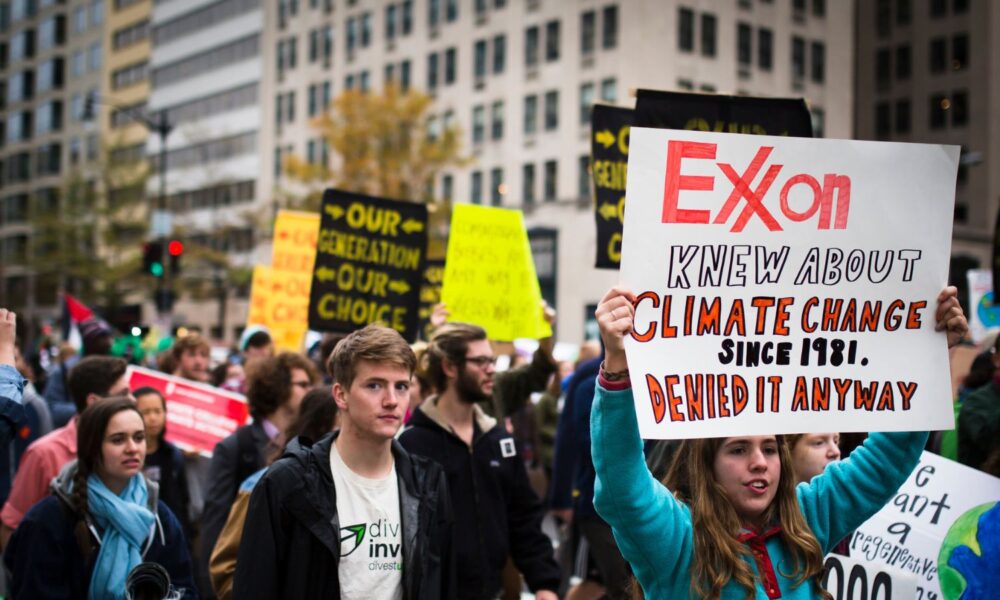In a few days, the Intergovernmental Panel on Climate Change (IPCC) will release its latest synthesis report that provides a comprehensive assessment of the current state of scientific knowledge on climate change, including its causes, impacts, and potential solutions. These reports reflect how the world has responded, or failed to respond, to climate change. As I prepare myself to read about how the world is inching closer to 1.5 degrees Celsius of warming, I think it’s essential to review how we got here, so we can forge a new path forward.
Previous IPCC reports have concluded that human activities such as burning fossil fuels are the primary cause of climate change: about 70 percent of global greenhouse gas emissions come from burning fossil fuels for electricity, transportation, and industry. Despite the scientific consensus on the cause and urgency of the issue, the fossil fuel industry has used disinformation and delay tactics to slow down the enactment of climate policies, resulting in our current reality, where increases in global average temperatures are rapidly approaching 1.5 degrees C.
Approaching 1.5 degrees C is terrifying because it signifies that decisionmakers are more concerned about profits and power than human rights, and the very real environmental justice issues communities are facing. But the good news is that we understand the problem and the source, so with strong collective action we can work to dramatically reduce our reliance on fossil fuels and prevent the worst impacts of climate change.
Big Oil has known for decades
The oil and gas industry has been aware of the potential climate impacts of burning fossil fuels for decades. In the 1960s and 1970s, oil companies such as ExxonMobil and Shell conducted research on the potential risks of climate change, including the potential for rising sea levels and increased global temperatures. We now know that ExxonMobil accurately projected rising temperatures back in 1977, but instead of sharing these results with the public or working on solutions, they led campaigns to publicly disparage climate science.
ExxonMobil’s senior scientist James Black warned the company’s executives in 1977 about the potential impacts of burning fossil fuels on the Earth’s climate, stating that there was a “general scientific agreement” that the release of carbon from burning fossil fuels could cause “significant temperature increases” and “have serious global consequences.”
Despite this knowledge and ample time to course correct, the industry has continued to extract and burn fossil fuels, while actively misleading the public, opposing efforts to reduce carbon emissions, and walking back climate pledges. Politicians have also continued to enable this by pandering to fossil fuel interests and refusing to stand up to defend the broader public interest.
Deny, delay, distract, deflect
The oil and gas industry has employed a number of well-known tactics to prevent climate action, including deliberately spreading disinformation. Using well-funded PR campaigns, think tanks, and lobbyists, Big Oil has worked hard to promote climate denialism and false promises, spurring confusion, while allowing the industry to continue with business as usual.
The industry has also used delay tactics to slow climate policy, pushing for “more research”—as through the science of climate change wasn’t settled—or less ambitious targets, or advocating for voluntary rather than mandatory measures. The industry has also used its financial power to influence politicians and lawmakers, effectively slowing down the adoption of policies aimed at reducing carbon emissions, and it has challenged critical climate policies in court, using self-serving legal arguments to delay climate action.
Through these tactics, and many others that my colleagues have discussed, the industry has managed to subvert efforts for urgent action on climate change, allowing it to continue to rake in record profits from the extraction and burning of fossil fuels. The result is a world that is rapidly warming. As previous IPCC reports detail, Earth’s average surface temperature has already increased by around 1.1 degrees C since the preindustrial era.
Clearing the path for climate action
A 1.5-degree C increase in global temperatures over preindustrial levels has significant impacts on the Earth’s ecosystems, human health, economies, and societies, resulting in a warmer world with devastating impacts such as more frequent and severe droughts, floods, and heatwaves. Policymakers and industry must take responsibility for their role in contributing to climate change so that we can limit its impacts and preserve a livable planet for future generations.
The good news is that there is a clear path to real climate action.
1) It starts with tracking emissions. We need strong disclosure processes for tracking and reporting carbon emissions. This can happen through a robust Security and Exchange Commission climate disclosure rule and congressional investigations.
2) Combat disinformation. The oil and gas industry has gained a lot of power through disinformation, but we can all work to counter its claims and devalue these tactics. UCS has some great resources to identify and address disinformation.
3) Advocate for change. Join with Indigenous groups and frontline communities to advocate for climate action. Push for accountability and policy changes that will reduce carbon emissions. Promote climate adaptation, and address existing loss and damages from climate change. In the United States, we have an increased responsibility to address our historic emissions and ensure a safe and fair future across the world.
4) Hold industry accountable for its actions. This can be done through legal action against companies that have knowingly misled the public about the risks of climate change, and setting standards that require companies to reduce their carbon emissions and transition to cleaner forms of energy. There are already dozens of lawsuits in the United States seeking to hold companies to account for their actions. Learn more about climate litigation here.
I am truly grateful that the IPCC continues to track and summarize the global body of climate science, but science is not enough. We need action! It’s empowering to know that as a global community we really understand what is driving climate change and how to address it. Let’s respond to this new IPCC report with clear action steps that can shift our climate future.

